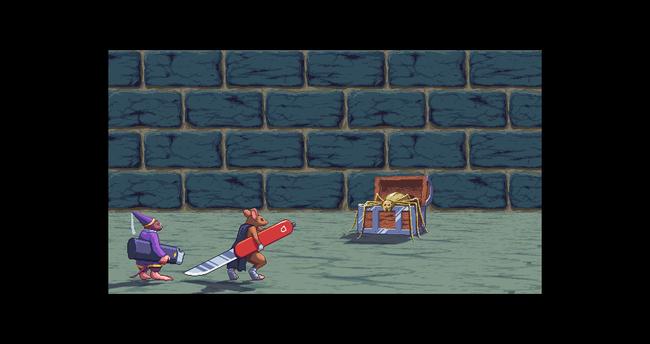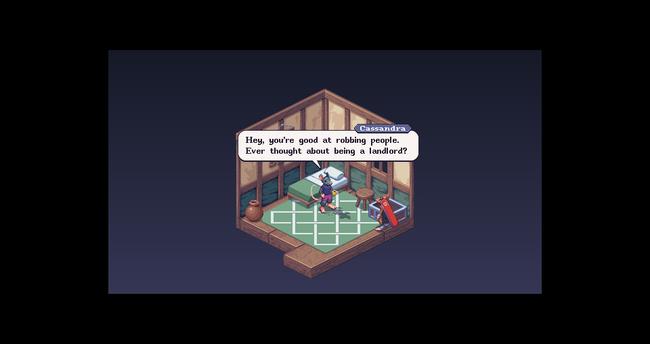
Small Saga Review
Small Saga is yet another indie RPG to find its footing thanks to Kickstarter. I hadn’t heard of it until very close to the release date, and I was primarily interested due to the developer’s previous work, Aviary Attorney. However, the setting alone may have been enough to pique my interest. Underneath London, there’s an entire society of rodents and other small creatures who observe the Old Way, that is…to not interfere with the Gods.
In Small Saga, the main protagonist is Verm, a mouse who shortly has a cause for vengeance against the Yellow God, having lost his tail and more to him. Starting as a lone warrior type, he eventually has to team up it see his goals through.

The combat is turn-based, with your side having a party of up to four and opponents ranging from a group of insects to a titanic cat. Moves all require a certain amount of energy to pull off, with one point being generated per turn. Verm equips a God tool, a switchblade, which can produce a multi-hit attack on one opponent. A very neat feature was when I had finished off an opponent partway through with that cleave attack and the move continued onto another enemy, instead of being partly wasted. Siobhan the noble lady mole is equipped with a fire stick (cigarette lighter) which in time can charge overclocks to increase her attack’s power. Gwen the mouse-shaped dragon, is similar to Verm in being damage-focused, but Bruce your squirrel bard is largely a support character being unable to deal damage directly for most of the game.
There are a few “consumable” items that can only be used once per fight, but will be available again in the next bout. Past the early sections of the game, I ceased to use them at all. Small Saga is quite easy, and the same strategies tended to work quite readily. I felt disappointed by most boss fights, though I did do most side quests, fill up my skill tree, and load up on good equipment where I found it. I thought to myself, “finally something tough”, when I had to fight four owls at once, but it was over before I knew it. There were a few bosses that pulled off some neat tricks, ensuring you had to be patient or restrategise, but again they were still so weak it didn’t mean much, and this was after a patch that increased the difficulty in some fights.
Upon finishing certain story beats (usually a boss fight), your party will get a skill point to be used on the tree. These skill trees have branching paths to work towards particular bonuses unique to each character, such as Gwen unlocking the ability for her every strike to induce bleeding. As with any good RPG, there are a few side quests, including a long exchange quest. Most of these just involve making some pit stops along the journey but there are a few extra areas and optional boss fights to experience, netting you equipment and items.

The setting takes place in modern times, but the underground society is largely medieval, whereas their language is a mix between that and if someone had left their phone open on TikTok above the sewer grates. This gives Small Saga a bit of an anachronistic feel, which is to say you’ll see a few “uwu”s among other things. Being set in London, there's a variety of dialects, such as our Scottish squirrel, and Irish Mole, but I only had to look up definitions (and pronunciations) a few times.
There are also quite a few references to games, pop culture, philosophy, and so on. The story primarily focuses on the main cast, giving them good character development, and even more if you do the optional content. There’s a lot of humor in the game, though I feel the levity wore down further on as things got more serious. The story gets political as you clash against the systems that are in your way, it’s neither nuanced nor heavy-handed, besides one area that was quite explicit about it. Overall the story fits into the category of more-than-serviceable, which was elevated by the attention to the main characters.
One of the highlights of this game is the visual presentation made with pixel art that is used to illustrate and not emulate. This is coupled with the fantastic overall design of the world, as various items that humans used are repurposed to make beds, or tools such as one character being chained up to a padlock. Most of the game plays from an isometric perspective adding a diorama-like feel to the world. Battles play with the party members in the foreground, and the often larger enemies in the background. The animations aren’t over the top but are nonetheless good. A few small cutscenes occur from time to time, many of which are pretty impressive works of pixel art, which is also exemplified in other set-piece moments. The sound design is great, making good use of a squeaky toy noise when needed. Music has a focus in this game, which might be a given considering you have a bard. With a varied use of instruments to create the fantasy flavor, such as flutes, harps, and bagpipes. It still made use of the electric guitar when needed, especially for the harder rock tracks. A lot of care was taken into making a sizeable soundtrack that I bought as soon as I was able.
I really enjoyed my short but sweet time with Small Saga of about seven hours, with my only disappointment being the lack of any difficulty without having to intentionally handicap myself. That and the Australian possum saying “yall” instead of “youse”. It’s a great little game filled with nice visuals, and mostly funny writing although the tone becomes less humorous further on. If you want a pint-sized adventure to enjoy with a similar-sized beverage, Small Saga is one to play.